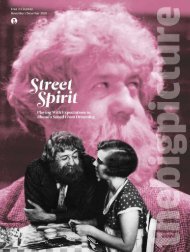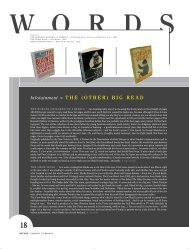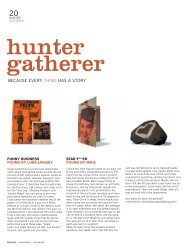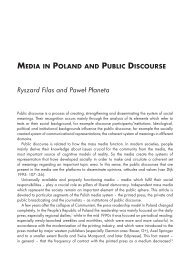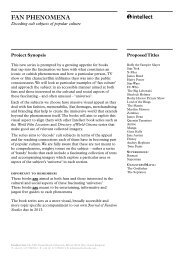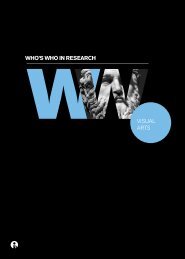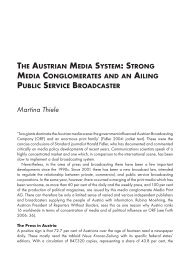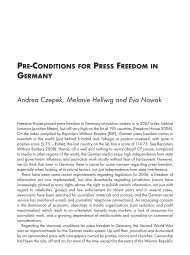Anthem - Intellect
Anthem - Intellect
Anthem - Intellect
Create successful ePaper yourself
Turn your PDF publications into a flip-book with our unique Google optimized e-Paper software.
Signifying Europe<br />
about how the magic of joy ‘reunites what custom strictly divided’, so that ‘all men<br />
will become brothers’. The narrative goes from dark suffering to sparks of joy and<br />
from traditional division to brotherly reunion. Associations include heroes finally<br />
resting and rejoicing after wars, perhaps reunited with their beloved dead. This could<br />
be relevant to a post-war experience that was urgent for Beethoven as a new Europe<br />
was to arise from the battlefields of the Napoleonic wars, and was to become again<br />
actualised after the Franco-Prussian war of 1870–1 and the two twentieth century<br />
world wars, which propelled Robert Schuman and the other EU architects. The<br />
symbols add up to a kind of palimpsest of meanings on several historical levels.<br />
The next verse invites ‘whoever can call even one soul his own on this earth’ to ‘join<br />
in our jubilation’, while those who were unable to build any kind of friendship ‘must<br />
creep tearfully away from this band’. In verse 3, joy is depicted as a natural resource for<br />
‘all creatures’, ‘all good, all bad’. Indeed, ‘pleasure was given to the worm’ so virtually<br />
no living being seems excluded in this universal celebration.<br />
C. Bar 331–594. This whole section starts in Bb-major and introduces a highly<br />
contrasting element, in tone and expression as well as in key, reminiscent of the<br />
second subject in a sonata form, so that the return to D major in bar 543 feels like<br />
a kind of recapitulation. The choir exclaims ‘O Gott’ (‘Oh God!’) in a prolonged<br />
fermata, and a march in Turkish style starts quite softly, with Glockenspiel and<br />
woodwinds, first instrumental, and then with increasingly loud instrumentation to<br />
the bass soloist singing ‘Froh, wie seine Sonne fliegen / durch des Himmels prächt’gen<br />
Plan’ (‘Glad, as His suns fly / through the Heaven’s glorious design’) to an ‘alla Turca’<br />
version in ‘Joy’ variation 7, followed by the Chorus 4 lyrics sung to ‘Joy’ variation 8,<br />
with extension leading to a fugato episode based on the ‘Joy’ theme, ending with the<br />
more straightforward ‘Joy’ variation 9 sung by the full choir in D-major. This ‘Turkish’<br />
variation of the ‘Ode’ theme introduces a new and, to generations of listeners, often<br />
problematic perspective on its meaning, which will be further discussed below. Its<br />
chorus words talk about ‘brothers’ running ‘joyful, as a hero to victory’. This introduces<br />
a male heroism that contrasts to the previous all-encompassing and more passive<br />
reception of the blisses of nature.<br />
D. Bar 595–654. But the marching Turkish episode is a short parenthesis. The<br />
music halts and the choir gently sings ‘Seid umschlungen, Millionen’ (‘Be embraced,<br />
you millions!’) to Chorus 1 lyrics in G-major, partly performed in a kind of dialogue<br />
between male and female voices, embodying the idea of men and women embracing<br />
each other. This again ends in a fermata, after which Chorus 3 in g-minor sings ‘Ihr<br />
stürzt nieder Millionen?’ (‘Do you bow down, millions?’), sounding as if angelic voices<br />
sail down from heaven to earth. The lyrics of this whole section offer a glimpse up to<br />
the heavens, as the human brothers are embraced by ‘a loving Father’ who is supposed<br />
to dwell ‘above the starry canopy’. This is expressed more as a hope and conviction<br />
than as truth, formulating the religious dimension as a matter of faith rather than<br />
166



